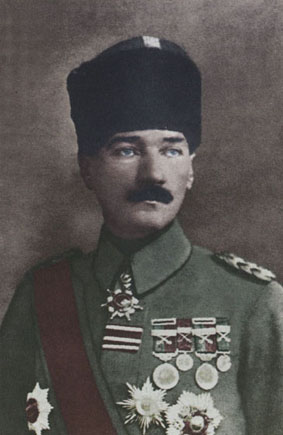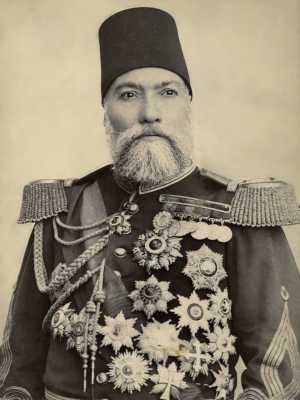Pasha
Pasha was a high rank in the Ottoman Empire's political and military system, particularly from the late 16th century until the end of the Empire in 1922. The title was awarded to governors, generals, dignitaries, and others as a mark of distinction and authority. Over time, the term "Pasha" became synonymous with the empire's elite and was a key part of its administrative and military hierarchy.
Origins and History[edit | edit source]
The title "Pasha" is of Turkish origin, derived from the older Persian word paşa, which means "lord" or "ruler". It was initially used in the Ottoman Empire to denote high-ranking officials but eventually became associated specifically with the empire's military and administrative leadership. The rank of a Pasha was above that of a Bey or Agha, but below that of a Vizier or a Sultan.
Roles and Responsibilities[edit | edit source]
Pashas were often appointed as governors of provinces, where they were responsible for the administration, justice, and military defense of their territories. In their role as military commanders, they led Ottoman forces in campaigns and battles across the empire's vast territories, which at its peak included parts of modern-day Europe, Asia, and Africa.
The authority of a Pasha varied depending on their specific appointment and the region they governed. Some Pashas had almost autonomous control over their provinces, while others were more directly controlled by the central Ottoman government. The number of tughs (horse-tail standards symbolizing authority) a Pasha was entitled to carry indicated their rank and the level of authority they possessed, with three tughs being the highest rank.
Cultural and Social Impact[edit | edit source]
The influence of Pashas extended beyond their military and administrative roles. They were key figures in the social and cultural life of the empire, often acting as patrons of the arts, architecture, and education. Many Pashas contributed to the construction of mosques, bridges, and public buildings, leaving a lasting legacy on the Ottoman architectural landscape.
Decline and Abolition[edit | edit source]
The title of Pasha, along with the Ottoman titles system, was officially abolished by the Republic of Turkey in 1922 as part of Mustafa Kemal Atatürk's efforts to modernize and secularize the country. The abolition of these titles was part of a broader set of reforms aimed at dismantling the Ottoman feudal structure and replacing it with a modern, democratic, and secular nation-state.
Legacy[edit | edit source]
Today, the title "Pasha" is remembered as a symbol of the Ottoman Empire's power and prestige. It is often used in literature and popular culture to evoke the empire's history and its complex social and political hierarchy. The legacy of the Pashas continues to be a subject of interest for historians and scholars studying the Ottoman Empire and its impact on the world.
Navigation: Wellness - Encyclopedia - Health topics - Disease Index - Drugs - World Directory - Gray's Anatomy - Keto diet - Recipes
Search WikiMD
Ad.Tired of being Overweight? Try W8MD's physician weight loss program.
Semaglutide (Ozempic / Wegovy and Tirzepatide (Mounjaro / Zepbound) available.
Advertise on WikiMD
WikiMD is not a substitute for professional medical advice. See full disclaimer.
Credits:Most images are courtesy of Wikimedia commons, and templates Wikipedia, licensed under CC BY SA or similar.Contributors: Prab R. Tumpati, MD





